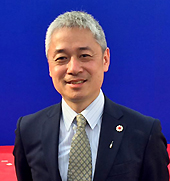 In the year 604, Prince Shotoku of Japan promulgated the Seventeen-Article
Constitution, a landmark ethical code intended to guide the moral and political
order of the nation. At the heart of this document lies its most enduring
principle: “Respect harmony (WA).” In the year 604, Prince Shotoku of Japan promulgated the Seventeen-Article
Constitution, a landmark ethical code intended to guide the moral and political
order of the nation. At the heart of this document lies its most enduring
principle: “Respect harmony (WA).”
The term WA encapsulates core values deeply rooted in Eastern philosophy—circulation
(JUNKAN), harmony (CHOWA), and tolerance combined with forgiveness (KANYO).
These concepts are not merely cultural; they stem from an ancient reverence
for the providence of nature, emphasizing balance, interconnectedness,
and the purification of human intentions.
The idea of KANYO, in particular, resonates with the spirit of MISOGI—a traditional practice of purification using the pure waters of mountains and forests, symbolic of inner cleansing and renewal.
In our increasingly interconnected world, the call for diversity—cultural,
religious, ethnic, and racial—has become a cornerstone of global discourse.
Yet diversity cannot flourish without mutual tolerance and the capacity
to forgive. It is here that the Spirit of WA offers a timeless and transformative
foundation, essential for building sustainable peace and inclusive development.
Since the French Declaration of the Rights of Man and of the Citizen in
1789, humanity—particularly in the Western world—has made remarkable advances
based on the ideals of freedom, equality, and fundamental human rights.
These are historic achievements of immense value.
However, these principles alone have not resolved all global challenges. Conflicts pursued under the pretext of liberty, widening socio-economic inequalities, and environmental degradation suggest that we must now look beyond the Western paradigm to a more integrative global ethic.
In this context, I believe that the ancient wisdom embedded in WA—conceived in Japan 1,400 years ago—can offer a complementary path forward. By bridging the ethical traditions of East and West, humanity may take a decisive step toward a more harmonious and spiritually grounded global civilization.
Already, UNESCO’s Memory of the World programme includes foundational Western
documents such as the French Declaration and the Magna Carta.
In the spirit of global dialogue and mutual enrichment, I humbly propose
the registration of Prince Shotoku’s Seventeen-Article Constitution into
the Memory of the World by the year 2030, the symbolic target year of the
Sustainable Development Goals (SDGs).
Let us together honor and share this ancient vision—one that may help illuminate a new path toward peace, justice, and the flourishing of all life.
Tatsuhiko MIYAMOTO
WA Project TAISHI
|
|

